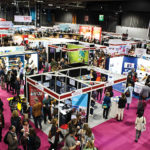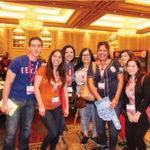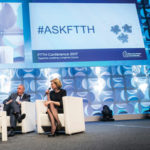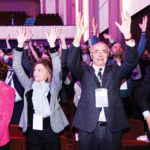
Aside from a few years during the world wars, AIA and APA have been meeting together since 1905. APA is North America’s principal society for the study of ancient Greek and Roman languages, literature, and civilizations, a discipline that goes hand in hand with the world of archeology studies represented by AIA members.
Challenges
The biggest challenge, according to Heather Gasda, CMP, APA’s director of meetings, is that the event is actually three meetings in one — the joint meeting as well as both AIA’s and APA’s own annual meetings. “Each society has its own academic program,” Gasda said, “but we do have a few joint sessions, and all sessions are open to all registrants, regardless of their affiliation.”
Gasda and Andri Cauldwell, AIA’s director of conferences and event planning, expect an increase in attendance over the 2013 meeting’s approximately 2,300 participants in Seattle — even though the event begins right after New Year’s Day. AIA and APA traditionally have chosen early-January dates to minimize the time that attendees — who are mostly professors and researchers — are away during the academic year. “On the plus side, we do tend to get very favorable rates and terms [with those dates],” Gasda said. “We had some concern this year because we start so early, but registrants seem to be liking the idea of spending New Year’s in Chicago.”
Setting up the exhibit hall is another challenge that springs from the early dates, according to Cauldwell. The majority of exhibitors are book publishers, so their freight is heavy and thus expensive to ship. If organizers were to add the extra labor expense that would come with a Jan. 1 setup date, it would likely be prohibitively expensive for many exhibitors. To contain costs, Cauldwell plans instead to set up the hall on the morning of Jan. 2 rather than the day before the show begins.
Initiatives
Organizers were able to secure a good room rate based on the meeting’s dates, but that means that they have specific F&B minimums to meet at the Hyatt Regency, Gasda said. Whereas in previous years receptions might be held at local museums or outside venues, for this meeting most will be contained at the host hotel. Aside from specifically planned receptions and networking events, “The annual meeting tends to have a strong ‘family-reunion’ atmosphere to it,” Gasda said, “so there will be countless receptions and spur-of-the-moment gatherings amongst colleagues and old friends.”
But the most significant initiative is all in a name. The American Philological Association will officially change its name to the Society for Classical Studies at the meeting. Proposed in March 2012 by then-President Jeffrey Henderson, and recently accepted by APA members, the change is intended to better reflect the goals of the organization and to acknowledge that “Classical Studies is a more transparent and comprehensible description of what we do,” President Denis Feeny wrote in a September letter to APA membership. “Classical Studies is also a more all-embracing term for the range of skills and disciplines within our professional domain.”
Convene’s Pre-Con/Post-Con series asks meeting planners about their challenges and how they intend to address them (Pre-Con), and then circles back around after the meeting has occurred (Post-Con) to see how well they worked out.



